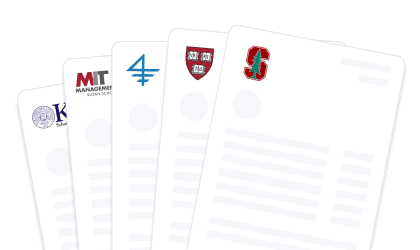
Join a free event
Learn from top coaches and industry experts in live, interactive sessions you can join for free.
Table of Contents
The Common App essay is one of the most important parts of your college application. While grades, test scores, and activities tell one part of your story, the Common App personal statement shows the admissions committee who you are as a person. It’s the one essay that gives you space to describe your background, personality, and values in your own design.
If you're a first-year applicant or transfer applicant applying to multiple schools, this personal essay is your chance to make a strong impression. You’ll respond to one of several essay prompts with a story that reflects your growth, character, and goals. In this article, we’ll go over the Common App essay prompts for 2024–2025, explain how to choose the right one, and share detailed tips for writing an effective response.
What is the Common App Essay?
The Common App essay is a 650-word personal statement required for all first-year applicants and most transfer applicants using the Common Application. This one essay is shared across multiple schools, which means it needs to reflect your character, values, and goals clearly and effectively.
The goal is to write one essay that helps the admissions committee learn something meaningful about you, something not obvious from your grades, test scores, or extracurricular activities. It should reflect personal growth, intellectual curiosity, and the experiences that shape your thinking.
The first step in writing an amazing Common App essay is understanding the Common App prompt. These prompts guide your writing by helping you focus on and describe a topic idea-specific aspect of your life. For 2024-2025, the Common App essay prompts are largely unchanged from previous years.
The Common App College Essay Prompts for 2026–2027
Prompt 1 – Background, Identity, Interest, or Talent
“Some students have a background, identity, interest, or talent that is so meaningful they believe their application would be incomplete without it.”
This prompt gives you the chance to explain a part of yourself that has shaped how you think or behave. You can write about your family, culture, values, interests, or a personal skill. The admissions committee wants to see how this background or talent has contributed to your personal growth and goals.
How to Approach:
Identify a core part of your identity
Think about something that is deeply personal to you. This could be your family background, cultural heritage, personal interest, or a talent you’ve developed through effort over time.
Describe how it shaped your thinking or actions
Go beyond listing facts. Share a story that shows how this part of your identity influenced your choices, how you relate to others, or what matters to you most.
Show personal growth
The most effective responses show change. How did this part of your identity lead to a new understanding, challenge a belief, or help you overcome something?
Expert Tips:
- Avoid generalizations. Be specific about how your identity or interest shaped your path or future career goals.
- Focus on experiences no one else can write about. What’s something unique about your story?
- If you’re applying to multiple schools, this topic can help show consistent academic interests or reasons for your intended major.
Prompt 2 – Challenge, Setback, or Failure
“The lessons we take from obstacles we encounter can be fundamental to later success.”
This prompt allows you to reflect on a difficult experience that helped shape your thinking. You might write about academic failure, personal loss, or any moment that tested you. What matters is how you responded and what you learned.
How to Approach:
Be specific about the challenge
Choose a moment where you genuinely struggled. This might include extenuating circumstances, a family responsibility, or a high school situation that forced you to act differently.
Focus on your actions
Describe what you did to work through the challenge. Did you change your habits, ask for help, or take accountability for a mistake?
Reflect on the outcome
Explain how the experience changed your thinking. Show what you learned and how it affected your future goals or behavior.
Expert Tips:
- Avoid writing about vague or common problems. Make your story personal and detailed.
- Show how gratitude affected or motivated your actions during the experience.
- Be honest. Admissions officers respect vulnerability and self-awareness.
Prompt 3 – Accomplishment, Event, or Realization
“Reflect on a time when you experienced an accomplishment, event, or realization that sparked a period of personal growth and a new understanding of yourself or others.”
This prompt is a good fit if you’ve had a specific experience that caused you to grow or see the world differently. The focus should be on the impact, not just the accomplishment itself.
How to Approach:
Choose one clear event
Pick something with meaning, winning a competition, losing someone close to you, or a volunteer experience that shaped your values.
Explain the growth
Show what changed. Did you think differently after this event? Did it give you a new understanding of yourself or others?
Connect it to your goals
Explain how the experience connects to your intended major, academic programs, or future career plans.
Expert Tips:
- Be genuine. Write about something that mattered to you, even if it wasn’t impressive on paper.
- Avoid simply summarizing events. Focus on how the event shaped your personal growth or thinking.
- This prompt is a good way to show why you’re interested in a particular kind of work or study.
Prompt 4 – Period of Personal Growth
“Reflect on something that someone has done for you that has made you happy or thankful in a surprising way. How has this gratitude affected or motivated you?”
This prompt focuses on a period of personal growth connected to someone else’s action. It helps you reflect on how gratitude can lead to change and how relationships shape who you are.
How to Approach:
Identify a specific time period of growth
This could be a life change (like moving to a new school), a year of reflection, or a difficult time that helped you reassess your values.
Show how your thinking changed
Talk about what you learned about yourself. This might involve letting go of assumptions, learning empathy, or becoming more open-minded.
Highlight the lessons learned
Explain how this growth has influenced your current actions, beliefs, or future direction.
Expert Tips:
- Be authentic. Reflecting on a period of growth requires honesty.
- Don’t just write what you think the admissions committee wants to hear.
- Focus on a specific story that led to your growth. Avoid generalizations.
Prompt 5 – A Belief or Idea
“Discuss an accomplishment, event, or realization that sparked a period of personal growth and a new understanding of yourself or others.”
This prompt allows you to explore a core belief or idea that influences how you think or live. It’s best when the idea is tied to your behavior, decision-making, or goals.
How to Approach:
Pick a belief that means something to you
Choose a belief or idea that has affected your decisions, even in a surprising way. It doesn’t need to be big, just meaningful.
Explain how it developed
Describe where the belief came from. Was it shaped by a conversation, a family member, or a challenge?
Connect it to your future
Explain how the belief or idea guides your goals, academic interests, or future career. What decisions has it helped you make?
Expert Tips:
- Avoid clichés like “I believe in being nice.” Choose something specific and personal.
- Show how the belief changed your behavior, not just your thoughts.
- Reflect on how this belief affects your thinking and how it fits into your academic programs.
Prompt 6 – Problem You’ve Solved or Want to Solve
“Describe a problem you’ve solved or a problem you’d like to solve.”
This prompt helps show your problem-solving skills and motivation to make a positive impact. It’s a good option for students interested in public service, science, or social change.
How to Approach:
Pick a real problem
This can be something you’ve worked on in your community, school, or personal life. It could also be an issue you want to address in the future.
Describe what you did or plan to do
If you’ve already acted on the problem, walk through the steps. If not, explain how you plan to take action and why it matters to you.
Show why it matters
Explain how this problem connects to your values or academic interests. Why do you care about it?
Expert Tips:
- Don’t choose a global issue unless you tie it to a specific, personal story.
- Highlight the action you took, even if the problem wasn’t fully solved.
- This prompt works well for students interested in solving real-world problems through their future career.
Prompt 7 – Topic of Your Choice
“Share an essay on any topic of your choice. It can be one you’ve already written, one that responds to a different prompt, or one of your own design.”
This prompt gives you freedom to write about anything that doesn’t fit the other prompts. You can use a story that responds to a different prompt or one you've already written if it still reflects your personal growth.
How to Approach:
Choose a focused topic
Don’t try to cover everything. Pick a clear story or idea and explain why it matters to you.
Make it personal
Even if the topic is unique or unusual, make sure the essay helps the admissions committee understand your values, mindset, or goals.
Stay within the structure
This is still a Common App personal statement, so make sure your writing has a clear point and shows personal development.
Expert Tips:
- If you use an essay you’ve already written, revise it so it fits the Common App format.
- Avoid writing about abstract ideas unless you connect them to real experiences.
- This prompt works well if you have a personal story that doesn’t match any other prompt exactly.
Access Top Coaching Resources for Free
Explore a library of expert videos, templates, and examples created by top coaches. Build your skills, enhance your resume, and prepare for success with step-by-step guidance. Browse them here.
How to Choose the Right Prompt
1. Focus on Personal Growth and Reflection
Admissions officers want to understand how you think, what motivates you, and how you’ve grown over time. Instead of just listing your achievements or describing events, focus on your personal growth. What lessons did you learn? How did you change as a result of your experiences? This will show admissions officers that you’re self-aware and capable of reflection.
2. Be Authentic
Your Common App essay should reflect who you truly are. Avoid trying to write what you think admissions committees want to read. If you choose a personal story, make sure it’s authentic and meaningful to you. Being genuine will make your Common App essay stand out in a way that feels honest and real.
3. Consider Different Prompts
Don’t feel limited to just one prompt when brainstorming Common App essay topics. Sometimes a personal story can fit well under more than one of the common app essay prompts. For example, a setback you faced might have led to personal growth, so it could work for both prompts. Think about which prompt allows you to tell your best story.
4. Select a Topic You’re Passionate About
When brainstorming for your Common App essay, choose a topic that excites you or one that you feel strongly about. Writing about something you're passionate about will help your essay feel more personal and engaging. Whether it’s a passion for a hobby, a cause you care about, or a challenge you overcame, enthusiasm will shine through in your writing.
Structuring Your Common App Essay
Once you’ve chosen your common app essay topic, it’s time to think about structure. A well-organized essay will not only keep the reader’s interest but also help convey your ideas clearly and effectively. In addition to the main essay response, some colleges may require short answer responses as part of their application supplements.
1. Introduction: The First Paragraph Matters
The first paragraph of your essay is crucial. It sets the tone for the rest of your application essay and helps hook the reader’s attention. You want to start with something that grabs attention without feeling overly dramatic. You can begin with:
- A personal anecdote
- A surprising fact or realization
- A question that reflects your theme
- A quote that’s meaningful to you
Note: Whatever you choose, make sure the introduction serves as an engaging lead into the rest of the essay. Also, clearly state what your essay will be about so the reader knows what to expect.
2. Body: Show, Don’t Just Tell
In the body of your essay, make sure to provide examples that support your main point. If you’re writing about personal growth, don’t just say you’ve grown; show how you’ve grown through specific examples and personal stories. Use vivid language and strong details to paint a picture.
Some tips for the writing section or body of your essay:
- Focus on a single, central story or theme. Don’t try to cover too much ground.
- Use specific examples and avoid generalizations.
- Show how the experience you’re writing about helped you grow or change.
- Consider using an extracurricular activity as a specific example to illustrate your growth, interests, or values. This can highlight meaningful experiences and opportunities for self-discovery.
Note: If your essay is about personal growth, don’t just say it, describe the actions, moments, or conversations that led to that growth.
3. Conclusion: End on a High Note
Your conclusion should leave a lasting impression. It should tie back to the central theme and reflect on the broader implications of your experience. Don’t just restate what you’ve already said; offer a reflection or insight that demonstrates your new understanding or what you learned from the experience.
Note: You can also explain how the story connects to your academic interests, intended major, or future goals. Keep the reflection simple and direct; don’t repeat the introduction or list everything again.
Read: How to End a College Essay (With Examples)
Writing Tips for the Common App College Essay Prompts
1. Keep It Focused
You have a word count limit of 650 words, so make every word count. Focus on one key experience or idea and avoid trying to cover too much. A tight, focused essay is more effective than one that tries to tackle too many topics.
2. Avoid Clichés and Generic Statements
Admissions officers read thousands of essays, so avoid using clichés or writing a generic essay that doesn’t say anything unique about you. For example, don’t write about how “winning a competition made me realize the value of hard work” unless you have a specific, personal story to back it up.
3. Seek Feedback
Before submitting your college essay, ask for feedback. Share your essay with teachers, mentors, or family members. They can provide constructive criticism and point out areas that need improvement.
4. Be Concise and Clear
While you want to showcase your personality and experiences, it’s important to stay clear and concise. Avoid unnecessary filler or overly complicated sentences. Write in a way that’s easy to follow and keeps the reader's interest.
5. Proofread and Edit
Once your essay is written, take the time to edit and proofread. Typos and grammatical errors can detract from the quality of your essay, so check your work carefully. Consider reading your essay aloud or using grammar-checking tools to catch mistakes.
Read: 4 Tips to Elevate Your College Essay
Common App Essay Examples to Guide You
Example 1: Overcoming a Challenge
This essay might start with a description of a personal setback, such as a health issue, and then focus on how the student navigated that challenge and emerged stronger. The essay could conclude by reflecting on how the experience taught the student the importance of perseverance and resilience, key qualities that would help in their future academic career.
Example 2: Reflecting on Personal Growth
A student might write about a period of personal growth that occurred after a difficult transition, such as moving to a new city or country. The essay will explore how this experience changed the student’s perspective and how they now approach challenges in a surprising way, contributing to their later success.
Common Mistakes to Avoid
Some students struggle with the Common App essay because they try to do too much or write what they think colleges want to hear. Here are some common issues to avoid:
| Mistake | What To Do Instead |
|---|---|
| Choosing an overused topic (sports win, travel story) | Focus on a specific, personal story with real impact |
| Writing like a résumé | Tell a story that shows your values or growth |
| Avoiding vulnerability | Be honest, admissions officers respect reflection |
| Ignoring the prompt | Make sure your essay answers the specific essay question |
| Repeating what’s already in the application | Use this space to share something new |
| Trying to sound impressive | Focus on writing clearly and showing how you think |
| Forgetting to proofread | Read your essay out loud and get feedback before submitting |
The Bottom Line
The Common App essay is your opportunity to show the admissions committee who you are beyond grades and test scores. By choosing the right prompt and focusing on one clear story, you can highlight your personal growth, values, and goals in a way that feels authentic. A strong essay doesn’t need to be dramatic; it needs to be honest, focused, and reflective.
Whether you're writing about a challenge, belief, identity, or idea, your response should give colleges a better understanding of how you think and what matters to you. Take your time, revise carefully, and use this space to share something meaningful.
Work With a College Essay Coach
If you want help choosing a topic, structuring your essay, or reviewing your first draft, working with a coach can make a real difference. A coach can help you write an essay that fits your goals, responds to the prompt, and highlights the thinking and growth that matter most in the application process. Also, check out our management consulting bootcamps and free events to unlock your full consulting potential!
See: The 10 Best Consulting Coaches for Case Interviews & Resumes
Read these articles next:
- What Looks Good on College Applications? 6 Tips to Make Your Application Stand Out
- How to Write a College Application Resume
- How to End a College Essay (With Examples)
- 3 Expert Tips for Applying to College
- How to Write an Amazing College Essay: 3 Tips for Success
FAQs
What are the 7 college essay prompts?
- The Common App provides seven official essay prompts. These include topics about your background, a challenge you’ve faced, a personal accomplishment, a period of personal growth, a belief or idea, a problem you’ve solved, and a topic of your choice. You’ll choose one essay prompt to answer in your 650-word personal statement.
What topic is best for a college essay?
- The best college essay topics are personal, specific, and show how you think. There’s no single “best” idea, but strong topics often focus on a turning point, personal growth, or a story that reflects your values. Choose an essay topic that you can write about honestly, and that connects to your goals, academic interests, or future career.
What are the 5 D’s of college essays?
- The “5 D’s” refer to common themes students write about: Death, Divorce, Depression, Disability, and Disease. These topics are not off-limits, but they are often overused. If you choose one of these, make sure your essay focuses on how the experience shaped your thinking, rather than just describing the event.
How to pick a college essay prompt?
- Start by writing down your strongest story or personal experience. Then review the Common App prompts to see which one fits best. You might find that your topic works for more than one prompt. Focus on the one that lets you show personal growth, new understanding, or a strong connection to your academic or career goals. Be sure to carefully read the following prompt to ensure your story aligns with what is being asked.
How do I write about my first-choice major in my college essay?
- When writing about your first-choice major, connect your academic interests, experiences, and personal goals to the major you’ve selected. Explain why this field is your first choice, how your background has prepared you, and how it fits into your future aspirations. This helps demonstrate your enthusiasm and readiness for your intended major.
Browse hundreds of expert coaches
Leland coaches have helped thousands of people achieve their goals. A dedicated mentor can make all the difference.



























